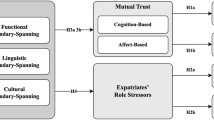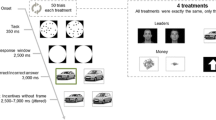Abstract
This study aimed to examine the mechanisms underlying the negative relationship between the feeling of being dehumanized by the organization and employees’ job satisfaction. More precisely, we argue that emotional labor (i.e., surface acting) and core self-evaluations act as mediators in this relationship. A total of 326 employees participated in our study. Firstly, the results showed that, independently of one another, both surface acting and core self-evaluations partially mediated the relationship between organizational dehumanization and job satisfaction. Secondly, surface acting and core self-evaluations were found to have serial mediation effects in this relationship. Accordingly, experiencing dehumanization from the organization leads employees to perform more surface acting with deleterious consequences for their core self-evaluations and finally their job satisfaction.


Similar content being viewed by others
References
Adams, G. A., & Webster, J. R. (2013). Emotional regulation as a mediator between interpersonal mistreatment and distress. European Journal of Work and Organizational Psychology, 22, 697–710.
Bastian, B., & Haslam, N. (2010). Excluded from humanity: The dehumanizing effects of social ostracism. Journal of Experimental Social Psychology, 46, 107–113.
Bastian, B., & Haslam, N. (2011). Experiencing dehumanization: Cognitive and emotional effects of everyday dehumanization. Basic and Applied Social Psychology, 33, 295–303.
Baumeister, R. F., DeWall, C. N., Ciarocco, N. J., & Twenge, J. M. (2005). Social exclusion impairs selfregulation. Journal of Personality and Social Psychology, 88, 589–604.
Becker, T. E., Atinc, G., Breaugh, J. A., Carlson, K. D., Edwards, J. R., & Spector, P. E. (2016). Statistical control in correlational studies: 10 essential recommendations for organizational researchers. Journal of Organizational Behavior, 37, 157–167.
Bell, C. M., & Khoury, C. (2011). Organizational de/humanization, deindividuation, anomie, and in/justice. In S. Gilliland, D. Steiner, & D. Skarlicki (Eds.), Emerging perspectives on organizational justice and ethics (pp. 167–197). Greenwich, CT: Information Age Publishing.
Bell, C. M., & Khoury, C. (2016). Organizational powerlessness, dehumanization, and gendered effects of procedural justice. Journal of Managerial Psychology, 31, 570–585.
Bhave, D. P., & Glomb, T. M. (2016). The role of occupational emotional labor requirements on the surface acting–job satisfaction relationship. Journal of Management, 42, 722–741.
Brotheridge, C. M., & Lee, R. T. (2003). Development and validation of the emotional labour scale. Journal of Occupational and Organizational Psychology, 76, 365–379.
Caesens, G., Stinglhamber, F., Demoulin, S., & De Wilde, M. (2017). Perceived organizational support and employees’ well-being: The mediating role of organizational dehumanization. European Journal of Work and Organizational Psychology, 26, 527–540.
Carlson, D., Ferguson, M., Hunter, E., & Whitten, D. (2012). Abusive supervision and work-family conflict: The path through emotional labor and burnout. The Leadership Quarterly, 23, 849–859.
Chang, C. H., Ferris, D. L., Johnson, R. E., Rosen, C. C., & Tan, J. A. (2012). Core self-evaluations: A review and evaluation of the literature. Journal of Management, 38, 81–128.
Christoff, K. (2014). Dehumanization in organizational settings: Some scientific and ethical considerations. Frontiers in Human Neuroscience, 8, 748.
Coyle-Shapiro, J. A., & Shore, L. M. (2007). The employee–organization relationship: Where do we go from here? Human Resource Management Review, 17, 166–179.
Crede, M., Chernyshenko, O. S., Stark, S., Dalal, R. S., & Bashshur, M. (2007). Job satisfaction as mediator: An assessment of job satisfaction’s position within the nomological network. Journal of Occupational and Organizational Psychology, 80, 515–538.
Deci, E. L., & Ryan, R. M. (1985). Intrinsic motivation and self-determination in human behavior. New York, NY: Plenum.
Deci, E. L., Ryan, R. M., Gagné, M., Leone, D. R., Usunov, J., & Kornazheva, B. P. (2001). Need satisfaction, motivation, and well-being in the work organizations of a former eastern bloc country: A cross-cultural study of self-determination. Personality and Social Psychology Bulletin, 27, 930–942.
Duffy, R. D., Autin, K. L., & Bott, E. M. (2015). Work volition and job satisfaction: Examining the role of work meaning and person-environment fit. The Career Development Quarterly, 63, 126–140.
Eisenberger, R., & Stinglhamber, F. (2011). Perceived organizational support: Fostering enthusiastic and productive employees. Washington, DC: APA Books.
Eisenberger, R., Cummings, J., Armeli, S., & Lynch, P. (1997). Perceived organizational support, discretionary treatment, and job satisfaction. Journal of Applied Psychology, 82, 812–820.
Eisenberger, R., Stinglhamber, F., Vandenberghe, C., Sucharski, I. L., & Rhoades, L. (2002). Perceived supervisor support: Contributions to perceived organizational support and employee retention. Journal of Applied Psychology, 87, 565–573.
Gino, F., Kouchaki, M., & Galinsky, A. D. (2015). The moral virtue of authenticity: How inauthenticity produces feelings of immorality and impurity. Psychological Science, 26, 983–996.
Gonzalez-Morales, M., Kernan, M. C., Becker, T. E., & Eisenberger, R. (2016). Defeating abusive supervision: Training supervisors to support subordinates. Journal of Occupational Health Psychology. Advance online publication.
Grandey, A. A. (2000). Emotional regulation in the workplace: A new way to conceptualize emotional labor. Journal of Occupational Health Psychology, 5, 95–110.
Grandey, A. A. (2003). When “the show must go on”: Surface acting and deep acting as determinants of emotional exhaustion and peer-rated service delivery. Academy of Management Journal, 46, 86–96.
Gross, J. J., & John, O. P. (2003). Individual differences in two emotion regulation processes: Implications for affect, relationships, and well-being. Journal of Personality and Social Psychology, 85, 348–362.
Haslam, N. (2006). Dehumanization: An integrative review. Personality and Social Psychology Review, 10, 252–264.
Hayes, A. F. (2013). Introduction to mediation, moderation, and conditional process analysis. New York, NY: The Guilford Press.
Hobfoll, S. E. (2001). The influence of culture, community, and the nested-self in the stress process: Advancing conservation of resources theory. Applied Psychology, 50, 337–421.
Hochschild, A. R. (1983). The managed heart: Commercialization of human feeling. Berkeley, CA: University of California Press.
Johnson, H. A. M., & Spector, P. E. (2007). Service with a smile: Do emotional intelligence, gender, and autonomy moderate the emotional labor process? Journal of Occupational Health Psychology, 12, 319–333.
Jöreskog, K. G., & Sörbom, D. (1996). LISREL 8: User's reference guide. Chicago, IL: Scientific Software International.
Judge, T. A., & Larsen, R. J. (2001). Dispositional affect and job satisfaction: A review and theoretical extension. Organizational Behavior and Human Decision Processes, 86, 67–98.
Judge, T. A., Locke, E. A., & Durham, C. C. (1997). The dispositional causes of job satisfaction: A core evaluations approach. Research in Organizational Behavior, 19, 151–188.
Judge, T. A., Locke, E. A., Durham, C. C., & Kluger, A. N. (1998). Dispositional effects on job and life satisfaction: The role of core evaluations. The Journal of Applied Psychology, 83, 17–34.
Kurtessis, J. N., Eisenberger, R., Ford, M. T., Buffardi, L. C., Stewart, K. A., & Adis, C. S. (2017). Perceived organizational support: A meta-analytic evaluation of organizational support theory. Journal of Management, 43, 1854–1884.
Levinson, H. (1965). Reciprocation: The relationship between man and organization. Administrative Science Quarterly, 9, 370–390.
Little, T. D., Cunningham, W. A., Shahar, G., & Widaman, K. F. (2002). To parcel or not to parcel: Exploring the question, weighing the merits. Structural Equation Modeling, 9, 151–173.
Locke, E. A. (1976). The nature and causes of job satisfaction. In M. D. Dunnette (Ed.), Handbook of industrial and organizational psychology (pp. 1297–1349). Chicago, IL: Rand McNally.
Mesmer-Magnus, J. R., DeChurch, L. A., & Wax, A. (2012). Moving emotional labor beyond surface and deep acting: A discordance-congruence perspective. Organizational Psychology Review, 2, 6–53.
Nguyen, N., & Borteyrou, X. (2016). Core self-evaluations as a mediator of the relationship between person-environment fit and job satisfaction among laboratory technicians. Personality and Individual Differences, 99, 89–93.
Rhoades, L., & Eisenberger, R. (2002). Perceived organizational support: A review of the literature. Journal of Applied Psychology, 87, 698–714.
Seeman, M. (1991). Alienation and anomie. In J. Robinson et al. (Eds.), Measures of personality and social psychological attitudes (pp. 291–295). San Diego, CA: Academic Press.
Sommer, K. L., & Baumeister, R. F. (2002). Self-evaluation, persistence, and performance following implicit rejection: The role of trait self-esteem. Personality and Social Psychology Bulletin, 28, 926–938.
Spector, P. E., & Brannick, M. T. (2011). Methodological urban legends: The misuse of statistical control variables. Organizational Research Methods, 14, 287–305.
Väyrynen, T., & Laari-Salmela, S. (2015). Men, mammals, or machines? Dehumanization embedded in organizational practices. Journal of Business Ethics, 1–19.
Wu, C. H., & Griffin, M. A. (2012). Longitudinal relationships between core self-evaluations and job satisfaction. Journal of Applied Psychology, 97, 331–342.
Zadro, L., Williams, K. D., & Richardson, R. (2004). How low can you go? Ostracism by a computer is sufficient to lower self-reported levels of belonging, control, self-esteem, and meaningful existence. Journal of Experimental Social Psychology, 40, 560–567.
Acknowledgements
This study was funded by the “Fonds Spéciaux de la Recherche” of the Université catholique de Louvain and by ARC under grant n°16/20-071 of the French Community of Belgium.
Author information
Authors and Affiliations
Corresponding author
Ethics declarations
Conflict of Interest
On behalf of all authors, the corresponding author states that there is no conflict of interest.
Ethical Approval
All procedures performed in studies involving human participants were in accordance with the ethical standards of the institutional and/or national research committee and with the 1964 Helsinki declaration and its later amendments or comparable ethical standards.
Informed Consent
Informed consent was obtained from all individual participants included in the study.
Electronic supplementary material
ESM 1
(XLSX 45 kb)
Rights and permissions
About this article
Cite this article
Nguyen, N., Stinglhamber, F. Emotional labor and core self-evaluations as mediators between organizational dehumanization and job satisfaction. Curr Psychol 40, 831–839 (2021). https://doi.org/10.1007/s12144-018-9988-2
Published:
Issue Date:
DOI: https://doi.org/10.1007/s12144-018-9988-2




